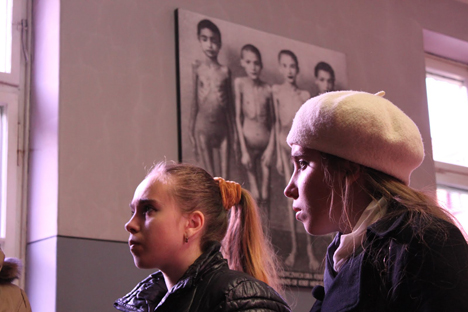Film shows Generation Z oblivious of the Holocaust

The twins Ksenia and Evgenia Karatigina thought that the holocaust was a glue for wallpaper. Source: Moscow International Film Festival
One of the most resonating premieres at the Moscow International Film Festival was the documentary by Mumin Shakirov, entitled “The Holocaust – Glue for Wallpaper?”
The reason for its creation was an event that caused a lot of fuss on the Russian blogosphere two years ago.
The 21-year-old twins Ksenia and Evgenia Karatigina, while participating on the trivia show “Crazy Beautiful” (MusTV, December 2011), when asked the question "What is the Holocaust?" replied: "Isn't it glue for wallpaper?"
The clip immediately appeared online, gaining a huge number of views and thousands of comments that mainly discussed and made fun of the girls’ lack of education. The sisters got their minute of fame, becoming more popular than they were counting on by participating on the TV show.
It was then that the journalist of Svoboda (“Freedom”) radio, Mumin Shakirov, had an idea to take the sisters to the memorial museum located on the grounds of the Auschwitz death camp in Poland.
Shakirov told journalists that he did not know how the young women would react, and he did not plan anything in advance.
“I was ready for any reaction. It was possible they wouldn't react at all — that they would just have a look and then go off shopping. If the girls had had a different reaction, well, it would have been a completely different story,” said Shakirov.
After the visit, one of the girls genuinely cried for a long time. As one of the journalists aptly put it, after visiting Auschwitz, “the girls became older by 70 years.”
The overly positive ending disappointed older viewers, who expected a more critical tone to be taken toward the younger generation.
Shakirov, however, had not planned to make a publicity movie; instead he took a detached and neutral position, trying not to pass judgment on the younger generation and being more interested in finding the causes for the depressing lack of knowledge.
As the director said, it was not easy to convince the young women to go on the trip and to take part in the filming: “More than anything, they were afraid that they would be portrayed as being stupid.” They agreed mainly because it was an opportunity for them to go overseas for the first time.
Shakirov traveled to the girls’ home—the village Krasnaya Gorbatka in Vladimir Oblast—and spoke to their mother and their history teacher at school (the girls are both currently studying in Moscow at the University of Design).
The girls are not what people tend to call disadvantaged children: They are quite well-socialized, mobile and active, and they speak proper Russian. This makes it all the more incredible that they had never heard of the Holocaust.
And they are not alone, which is clearly shown in the documentary. Their history teacher admits feeling responsible for not telling her students about the Holocaust. She says that she does not feel ready to breach this topic; she will talk about it when she “finds the right approach.”
The girls’ mother, even though she is critical of her daughters, presents this argument to justify what happened: “I asked all my neighbors, friends and colleagues—none of them could tell me what the Holocaust was.”
Related:
Brad Pitt opens the Moscow International Film Festival
The girls’ story in this film becomes a portrait of their generation, which has no idea about the crimes committed by the Nazis. We are faced with a phenomenon that is much more complex than “Holocaust denial”: an absence of knowledge about it.
Shakirov does admit that this problem is present not only in Russia. In Europe, the United States and even Israel, many members of the younger generation prefer not to learn about this topic.
Only one movie theatre in Russia is currently planning to screen the movie, with 10 sessions at the Documentary Film Center in Moscow. Shakirov plans to independently promote his film on the Internet.
The movie, which might count on government support, has no chance for huge commercial success. Meanwhile, it could be a great tool for Russian teachers who still cannot find the right words 70 years after the end of the war.
All rights reserved by Rossiyskaya Gazeta.
Subscribe
to our newsletter!
Get the week's best stories straight to your inbox
